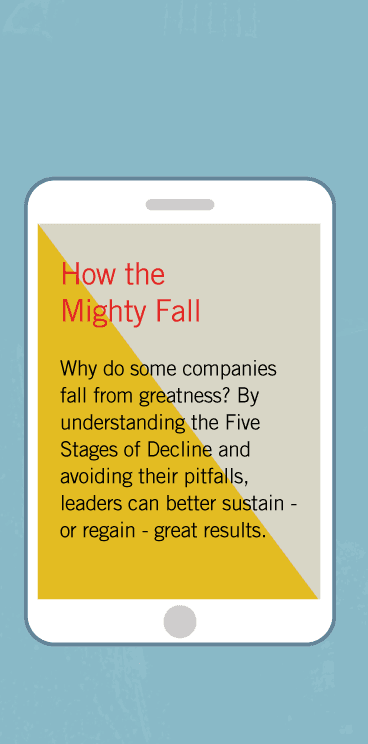The Daily Drucker
But the address matched, so I ambled up to the front door and rang the bell. I waited. Nothing happened. So, I rang again. "Okay, okay, I'm coming," I heard a voice from inside the house. "I'm not so fast anymore." The voice sounded cranky, and I expected a curmudgeon to open the door, but instead found myself greeted with a gracious smile that made me feel that my host was really happy to see me, even though we'd never met. "Mr. Collins. So very pleased to meet you," said Drucker with a handshake that warmly invited me across the threshold. "Please come inside."
We settled in the living room, with Drucker asking questions from his favorite wicker chair, probing, pushing, challenging. He gave freely of his wisdom, asking nothing in return. He simply wanted to contribute to my development at what was then a pivotal stage of my career; I was only thirty-six years of age with no significant reputation. His generosity of sprit explains much of Drucker's immense influence. I reflected back on his work, The Effective Executive, and his admonition to replace the quest for success with the quest for contribution. The critical question is not, "How can I achieve?" but "What can I contribute?"
Drucker's primary contribution is not a single idea, but rather an entire body of work that has one gigantic advantage: nearly all of it is essentially right. Drucker has an uncanny ability to develop insights about the workings of the social world, and to later be proved right by history. His first book, The End of Economic Man, published in 1939, sought to explain the origins of totalitarianism; after the fall of France in 1940, Winston Churchill made it a required part of the book kit issued to every graduate of the British Officer's Candidate School. His 1946 book The Concept of the Corporation analyzed the technocratic corporation, based upon an in-depth look at General Motors. It so rattled senior management in its accurate foreshadowing of future challenges to the corporate state that it was essentially banned at GM during the Sloan era. Drucker's 1964 book was so far ahead of its time in laying out the principles of corporate strategy that his publisher convinced him to abandon the title Business Strategies in favor of Managing for Results, because the term "strategy" was utterly foreign to the language of business.
There are two ways to change the world: with the pen (the use of ideas) and with the sword (the use of power). Drucker chooses the pen, and has rewired the brains of thousands who carry the sword. When in 1956 David Packard sat down to type out the objectives for the Hewlett-Packard Company, he'd been shaped by Drucker's writings, and very likely used The Practice of Management—which still stands as perhaps the important management book ever written—as his guide. In our research for the book Built to Last, Jerry Porras and I came across a number of great companies whose leaders had been shaped by Drucker's writings, including Merck, Procter & Gamble, Ford, General Electric, and Motorola. Multiply this impact across thousands of organizations of all types—from police departments to symphony orchestras to government agencies and business corporations—and it is hard to escape the conclusion that Drucker is one of the most influential individuals of the twentieth Century.
At one point during my day with Drucker, I asked, "Which of your twenty-six books are you most proud of?"
"The next one," snapped Drucker.
He was eighty-five years young at the time, cranking at a pace of nearly a book a year, plus significant articles. Over the next nine years, he added another eight books to the count, and continues at age ninty-four to produce work highly relevant to the challenges of the twenty-first century. For Drucker, writing is a compulsion—a form of productive neurosis, which explains his grand output. "I started in journalism," he explained in response to the question of how he manages to write so much, so fast. "I had to write fast to make deadline. I was trained to be prolific." I do not know precisely how many pages Drucker has written so far in his career, but his books alone almost certainly exceed 10,000 pages. Drucker occupies a rare quadrant of genius, being both highly prolific and remarkably insightful.
Drucker's genius shines best in the short paragraph or single sentence that cuts through the clutter and messiness of a complex world and exposes a truth. Like a Zen poet, Drucker packs universal truth into just a few words; we can return to his teachings repeatedly, each time with a deeper level of understanding. This wonderful collection presents these pearls of insight in one place, where you can reflect upon them one at a time, without having to read all 10,000 pages. Professor Maciariello has masterfully culled the very best of Drucker and deserves our appreciation for this significant service.
Drucker likes to tell the story of a Greek sculptor from 500 BCE who was commissioned by the city of Athens to construct a set of statues to ring the top of a building. (Entitled "Pursuing Perfection," you may find this story on October 1.) The sculptor toiled for months longer than expected, making the backs of the statues as beautiful as the fronts. The city commissioners, angered by his extra work, asked: "Why did you make the backs of the statues as beautiful as the front? No one will ever see the backs!"
"Ah, but the Gods can see them," replied the sculptor.
This book is like getting all the fronts of the statues assembled in one place for us to enjoy. But what makes the fronts so beautiful is all the thinking and work that went into the entire statue—work you and I can never see, but without which the work would lack integrity. We know we can trust these wonderful gems because Drucker's entire body of work, the hundreds of thousands of hours of thinking and reflection by one of the piercing intellects of the modern age, stands behind this carefully selected set of words.
At the end of my day with Drucker in 1994, we pulled up to his home after a meal at his favorite local restaurant. "How can I thank you, how can I repay you?" I asked, knowing that the value of a day with Drucker was incalculable.
"You have already repaid me," said Drucker. "I have learned much from our conversation today." That's when I realized that what ultimately sets Peter Drucker apart is that he does not see himself as a guru; he remains a student. Most management gurus are driven to say something; Drucker is driven to learn something. Drucker's work is interesting—he is interesting—because, to borrow a phrase from the late John Gardner, he remains relentlessly interested.
"Just go out and make yourself useful," he finished. Then, without another word, he got out of the car and walked into his modest home, presumably back to his typewriter, to continue carving the fronts and backs of beautiful statues of great ideas.
JIM COLLINS
Boulder, Colorado
August 3, 2004






